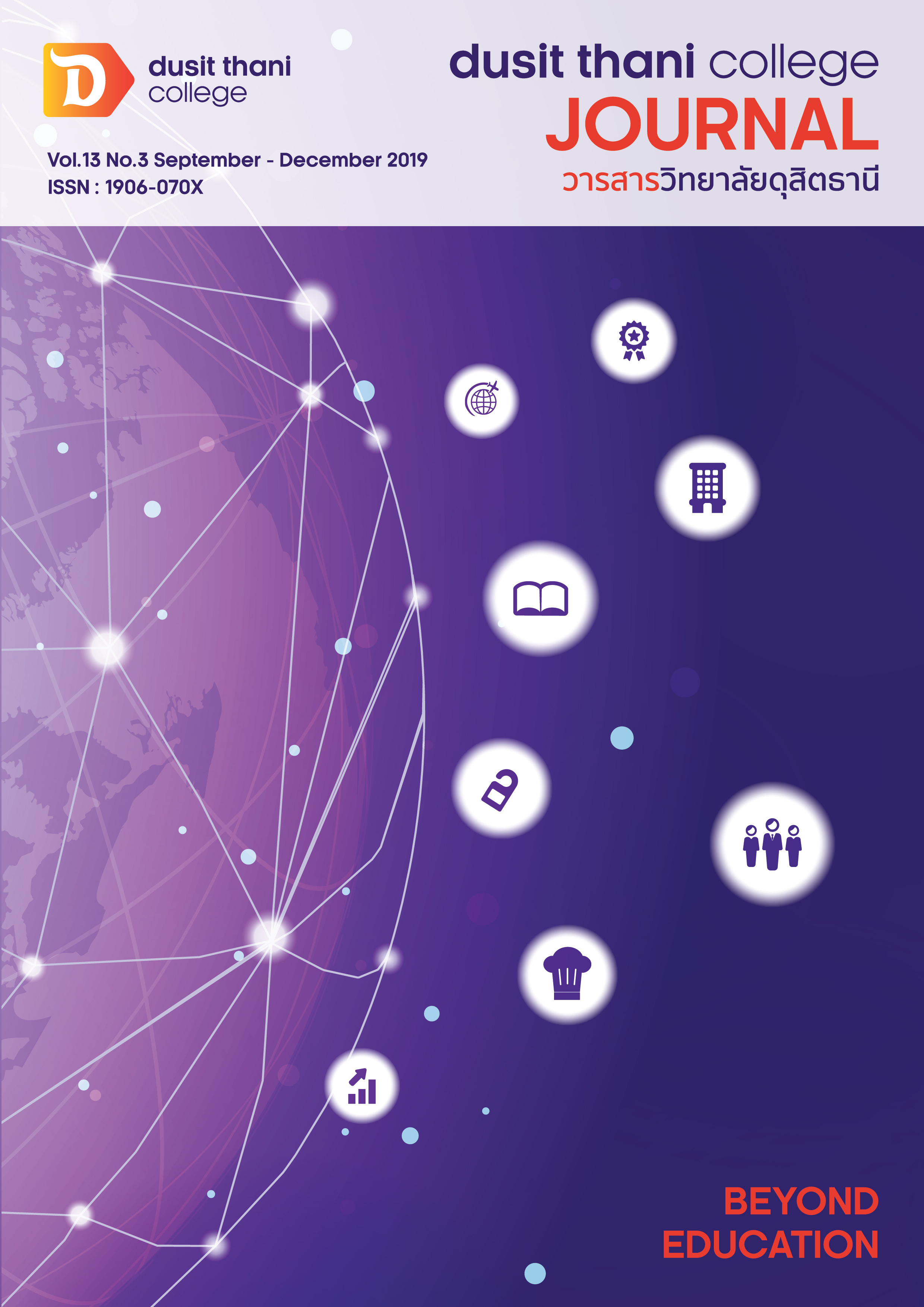Paradigm to Enhance Thailand Tourism Marketing Development for Japanese Senior Citizens
Main Article Content
Abstract
The purpose of this research paper is to study the paradigm shifts in the processes of Thai Tourism Market Development and in relation to senior Japanese tourists Methodology Descriptive Qualitative research approach is used in this study and semi-structural questionnaire is used to collect data and assess how the paradigm shifts take place. Study sample consists of 31 individuals representing four groups; namely 1) government agencies, 2) Tourist entrepreneurs in Thailand who provide services for senior Japanese tourists, 3) Local entrepreneurs, and 4) Senior Japanese tourists.
The study finds that all the groups tend to coordinate and support each other for developing and promoting their tourism products and services in different work processes. Implications of the study suggests that government agencies working in planning and policy making process are responsible for developing and promoting tourism for senior Japanese tourists in response to the needs of the members of that group. Further, it is found that entrepreneur should come forward, promote and maintain strong public relations with senior Japanese tourists. Plans and programs are needed to implement to assure the quality and safety of products and services before offering them for tourists. Lack of Japanese language skills is also been identified as a major barrier to take off the paradigm shifts. It finds that appropriate training and timely capacity building programs can create value within processes in the tourism industry. In terms of price competitiveness, quality of products, income and employment generation, local entrepreneurs are found to be key aspects in tourism development processes and therefore, tourism products and services can be offered at fair price.
Article Details
Article Screening Policy
- All research and academic articles to be published must be considered and screened by three peer reviews in the relevant field / article.
- All articles, texts, illustrations and tables published in the journal are the personal opinions of the authors. Editors don't always have to agree. And no responsibility whatsoever is the sole responsibility of the author.
- The articles to be published must never be published. Where did you first publish? And not in the consideration of other journals If the audit found that there has been a duplicate publication It is the sole responsibility of the author.
- Any article that the reader sees as being plagiarized or impersonated without reference. Or mislead the work of the author Please let the journal editor know it will be your greatest blessing.
References
2. Euachongprasit, Santichai. (2006). Strategic Tourism Management. Bangkok: Sam Charoen Panit (Bangkok) Co., Ltd Press. [In Thai]
3. Tourism Authority of Thailand. (2017). Domestic Tourism Statistics (Classify by units). Department of Tourism Information, Bangkok. [In Thai]
4. Department of Tourism, Ministry of Tourism and Sports. (2016). Report of Tourist Situation in August 2016. [In Thai]
5. Thiensiri, J., Boonyanupong, S., and others. (2012). Evaluationof the situation and the potential of the Slow Tourism Market for Elderly Tourists in Upper-North Region of Thailand. FEU Academic Review, Vol 6 (1): 49-62. [In Thai]
6. Podhisita, C. (2011). The art and science in the qualitative research (5th ed.). Bangkok: Amarin Printing [In Thai]
7. Jittangwattana, B. (2016). Marketing Management for Tourism Industry (3th ed.). Bangkok: Thammasat University [In Thai]
8. National Tourism Development Plan. (2017). The Second National Tourism Development Plan (B.E. 2016 – 2020). National Policy Committee. [In Thai]
9. Silaparasee, N. (2017). Tourism Industry (7th ed.). Bangkok: Chulalongkorn University [In Thai]
10. Sellick, M. C. and Thomas E. M. (2004). “Tourism for the Young-old and Old-old”.
New Horizons in Tourism: Strange Experiences and Stranger Practices.
Cambridge: Edited by TV Singh,CABI Publishing.
11. Sinrapaserd, Nisa. (2017). Tourism Industry. Bangkok: Chula Press. [In Thai]
12. Tourism Promotion Plan of Samut Sakhon Provincial Administration Organization. (2016). Tourism Promotion Plan of Samut Sakhon Provincial Administration Organization B.E. 2016 – 2018. Samut Sakhon Provincial Administration Organization. [In Thai]
13. National Strategy. (2018). National Strategy for 20 years (B.E. 2018 – 2037) (Reform). Office of Secretary of National Strategy Committee, Office of the National Economics and Social Development Board. [In Thai]
14. Isichaikul, Ranee. (2014). Specific Tourism Management. Bangkok: STOU Book (in Thai).
15. Chantavanich, S. (2013). Approach of Qualitative Research (21st Edition). Chulalongkorn
University Press, Bangkok. [In Thai]
16. Chetmas, Surachet and Datchanee Aimphan. (1996). National Park and Preservation. in Surachet Chetmas and Datchanee Aimphan (Editor), Reserved Area Management Lecturer Training: Reserved Area Management and Bio-Diversity Preservation. Bangkok: Thai Pattanapanich (in Thai).
17. Bagus and Utama (2012). Motivation and Satisfaction of Senior Tourists for Traveling
Overseas. Dhyana Pura University, Bali, Indonesia
18. Cabinet Office Government of Japan. (2015). Elderly Person Statistics Report.
Retrieved January 31, 2018, from www8.cao.go.jp/kourei/whitepaper/w-2017/html/gaiyou/s1_1.html
19. HISの情報誌会員. (2016). シニア層の海外旅行.トラベルボイス. Japan
20. Hall, C. M. (2006). ‘Demography’ Tourism Management Dynamics: Trends, Management and Tools Edited by Dimitrios buhalis and Carlos Costa. Burlington: Elsevier Butterworth-Heinemann.
21. IMF. (2017). 名目GDPの推移. Retrieved June 22, 2018, from http://ecodb.net/country/JP/imf_gdp.html
22. JTB Tourism Research and Consulting Co. (2017). 海外観光旅行の現状2017. Japan
23. JTB. (2018). “Recommended tours in Bangkok”. Retrieved January 30, 2018, from
https://www.jtb.co.jp/kaigai_guide/asia/kingdom_of_thailand/BKK/. [In Thai]
24. Ministry of Justice. (2018). 出入(帰)国者数. Retrieved June 22, 2018, from
www.moj.go.jp/housei/toukei/toukei_ichiran_nyukan.html
25. Nastasi, B. K. and Schensul, S. L. (2005). “Contributions of qualitative research to the validity of intervention research”, Journal of School Psychology. 43(3), 177-195.
26. Chaisuparakul, S. (2015). “Paradigms in Social Science Research”, Journal of Chandrasem Sarn. 21(40), 1-8. [In Thai]
27. Potisitta, Chai. (2011). Science and art of quality research. (5th ed.). Bangkok: Amarin Printing and Publishing Press. [In Thai]
28. Tokyo Metropolitan Government. (2016). 平成 28 年「敬老の日にちなんだ東京都の高齢者人(推計). Retrieved January 27, 2018, from http://www.toukei.metro.tokyo.jp/koureisya/kr16rf0000.pdf
29. Us Bureau of the Census. (2008). International Data Base. Retrieved January 29, 2018, from www.census.gov/programs-surveys/acs/guidance/comparing-acs-data/2008.html
30. World Tourism Organization. (2017). Tourism Highlights, 2017 Edition. Retrieved June 21, 2018, from https://www.e-unwto.org/doi/pdf/10.18111/9789284419029


